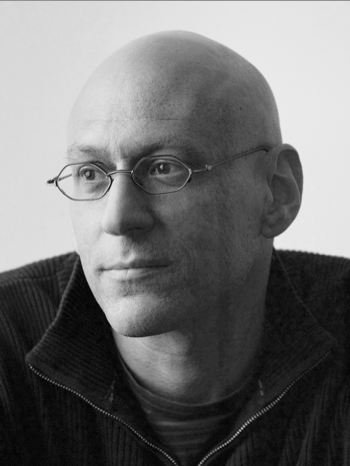Iowa and Hollywood will get a little closer this summer.
In August 2016, an Iowa Writers’ Workshop alumnus will costar in a film directed by James Franco.
David Shields explores questions about life and art in his new book and film, I Think You’re Totally Wrong: A Quarrel.
The book is the script of an argument that Shields had with a former student of his, Caleb Powell. Powell and Shields cowrote the book and costarred in the film based on it, which is directed by James Franco and will come out in this summer.
“It concerns revealing secrets, certain betrayals, and what sacrifices an artist would make for life and vice versa,” Powell said. “Would you betray a wife, family, friend, editor, important business acquaintance, if it would help promote your art and career?”
Shields said the book was in the format of an argument in order to mirror real-life arguments that he and Powell often had.
“Caleb basically drove me nuts,” he said. “From the moment I met him, he got under my skin, and I think I got under his skin. I’m a writer, and I’m always looking for friction and tension. I had to either block Caleb from my email and Twitter account, or I had to do something about it.”
Shields said the book caught the attention of Franco, who was one of his graduate students in Columbia University’s M.F.A. Creative Writing program. “Franco was becoming a director at the time and directing a lot of low-budget movies. Caleb and I shortened the book down to half its length, called it a script, and we went down to LA to try to shoot.”
While shooting the movie, Shields, Powell, and Franco strayed from the script and broke into a real argument.
“David and I, when writing the book, came to agree that some of the secrets we shared should be better left out of the book,” said Powells. “But some secrets came out on camera, and this created tension.”

Shields said throwing out the original script made the project a better movie.
Powell’s refusal to bring real-life secrets into the film perfectly demonstrated the conflict between life and art that the book and movie was about, Shields said. To him, that was the most interesting part of the film.
David Hamilton, a professor emeritus of English and the editor of the Iowa Review, said Shields has developed a reputation in the literary field.
“He became somewhat celebrated for preferring fact to fiction, or at least nonfiction to fiction and for being cagey about just how fictive his nonfiction might be,” said Hamilton. “And he is a very industrious, hard-working, productive writer, and often quite funny.”
Shields gave up fiction writing and novel writing a long time ago.
“I wrote three novels from my 20s to my mid-30s, and then halfway through my fourth novel I could no longer write the novel,” he said. “I spent 20 years trying to figure out why the novel went dead of me.”
Now, Shields said, his work is more focused on how art and literature interacts with the modern world.



